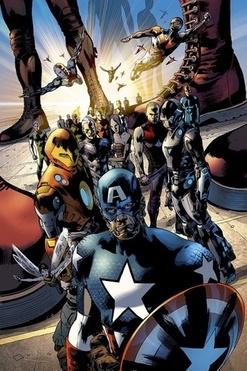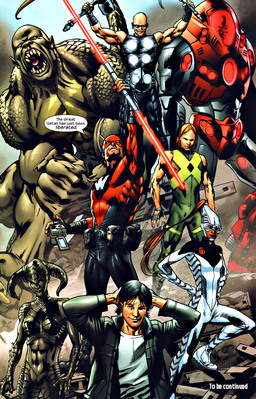Comics /
Spotlight
Should the Ultimates Have Saved America?
By Zak Edwards
September 6, 2009 - 11:45
With Mark Millar back on Marvel’s Ultimate Comics line writing their version of the Avengers, I found myself going back to his original run on the Ultimates, appropriately called Ultimates 1 and 2. After rereading all twenty-six issues of the series, I found myself thinking about the legitimacy of the super-hero in Millar’s story. The Ultimates, almost notoriously, introduced Ultimate versions of classic characters who had their nobility removed. Captain America, for example, was still the physical embodiment of the perfect male but no longer had the soul to back it up. He’s possessive, aggressive, stuck completely in the past, and picks and chooses advancements in society while remaining self-righteous on the moral degradation of the new world against the one he grew up in. Similarly, other members of the team have serious issues, from being in domestically violent relationships to bouts with alcoholism and beyond. But what I really want to focus on in this article is the larger world around these questionable persons of mass destruction, focusing mostly on the last arc of Ultimates 2, around issues 7 to 13.
 |
The world Millar creates is completely like our own in many ways. The twin towers have fallen and America has begun its colonial moves into the Middle-East, demonizing the men, women, and children in this now enemy territory. The Ultimates themselves, under the control of the American government, have been quietly used to invade and perform tasks in these countries despite promises contrary, and the members of the team seem to have no problem involving themselves in such politically charged activities. But what struck me so entirely about this final arc, revolving around the invasion and taking over of the United States (in less than an hour, no less!) and its eventual recovery, is how much the United States becomes the Iraq of the world we live in and the actions of the ‘evil invaders’ becomes all too familiar. The tables have been turned, but what else really changed?
A question I found myself asking in this series was ‘is this invasion of the United States really a bad thing?’ The invaders take over the States with no more civilian casualties than what destruction the Ultimates have been shown to cause on their own soil. Furthermore, the Liberators are not depicted as making gross sums of money like the Ultimates, and doing something for free is generally considered much more noble then doing the same action for monetary profit. The priority of the Liberators, the invading group, is to make the world a safer place, to “stop preemptive strikes” and to have America’s plans “curtailed” for fear of what they may do next, all while ensuring the American people don’t “suffer for the crimes of their government.” The language used by Millar echoes that of what the American government has been saying for years now, the excuses they used, as if their global policy is a form of preventative maintenance. Only now, it turns out Americas self-made enemies have done a better job of invading an enemy territory than the States could ever imagine. The new regime lasts only a couple of days at best before the Ultimates come in to do the inevitable saving of the day (if it needed saving at all), but the only oppression on the American people depicted is a curfew and non-violent crowd control taken care of by Hank Pym’s androids. The invaders talk of free elections, a single piece of dialogue which packs some of the most political punch in the entire series, suggesting the free world, who has been leading the charge into the Middle-East is not, in fact, free at all, simply more covert in its lack thereof. People who have seen Michael Moore’s Fahrenheit 9/11 are aware of possible election fraud present in the United States and these Liberators (this name itself being highly politicized and utilizing much of the language the American government has used for justification of its invasions of the Middle-East) have come to ensure the voice of the people is heard, after they take over of course. This is another aspect of this story, while the Liberators are mirroring America’s invasion of Iraq while doing a better job, the complexities of the justifications and procedures of such an act are still discussed.
 |
| The Liberators: Abomination, Perun, Crimson Dynamo, Abdul al-Rahman, Schizoid Man, Hurricane, and the Swarm |
Even a look at the Liberators, all mirror images of the Ultimates, suggests something in the actual workings and duties of the Ultimates. The Liberators are not doppelgangers of the Ultimates, but very much identical if only looking at them from the opposite perspective. As mentioned by Nick Fury, the character of Abdul al-Rahman (whose last name, according to the Marvel database, means “mercy,” another point to consider and I don’t believe to be ironic) has an identical history to Captain America, only replacing the symbol of the shield with that of a sword. Perun, named after the Slavic thunder god, is, “for all intents and purposes, a Soviet Thor,” carrying a hammer and sickle instead of just a hammer. The Crimson Dynamo echoes Iron Man, which is something very serious to consider. While Tony Stark’s often comical use of alcohol is charming, the actual idea of a man operating such destructive machinery while heavily intoxicated is irresponsible and highly dangerous at best. When the Crimson Dynamo does eventually break-off from orders and starts killing civilians, it is hard not to see the chances of Iron Man doing a similar thing. Heroes disobeying orders generally leads to congratulations by the higher powers after their actions are seen to be the better route, but Millar shows how stupid and dangerous this often celebrated behaviour is. Also, the major difference between Crimson Dynamo and Iron Man, in terms of illegal activity, is blue and white collar crimes. Crimson Dynamo is primarily guilty of more blue collar, murder. Tony Stark, however, admits to breaking labour laws and at the end of Ultimates 2 #13, foresees making a profit from convincing the Ultimates to move away from being a government body. The Abomination, a Hulk equivalent who maintains his intellect, eventually loses to the Hulk through sheer brute force instead of reason. This all leads to questioning the legitimacy of the heroes Millar has created. The Ultimates were always people who were very difficult to like despite their ‘heroics,’ but Millar went on step further in suggesting they are exactly like those we have been told are our enemies in almost every respect. They are on the government payroll and are not seen disagreeing with the actions of their government. The exception, of course, is Thor, who is constantly reminding the world and the Ultimates he is not an official member, but a helper in times of crisis. So when they do actually win the day and restore George Bush to power, readers are left wondering whether a return to the status quo is still best idea.
The final arc of Ultimates 2 turns the tables, making the United States a version of Iraq while making the international collective of the Liberators a reflection of the United States. The natural reaction is to polarize the characters of the Ultimates and the Liberators, believing one side (the American side) to be wholly good while the other to be wholly bad, but Millar complicates this through demonstrations of grey areas. Both sides are so grey they meet in the middle. As Ultimates had always been a politically charged comic book series, discussing the effects of persons of mass destruction on America’s recent attempts at ‘liberating’ the world it can’t understand. The first panel of the issue entitled “Axis of Evil” mocks the classic patriotic shots of Captain America, showing him pointing to the sky, his uniform shining in the sun, saying move along to people he has just forced from their homes, people who know “the Americans shoot you if there are no cameras around.” Millar’s concerns are ones every citizen should have, questioning government actions and allegiances. I remember reading a quote from an American paper once, the journalist was asking how someone could be so unpatriotic as to not support their own president. A view, I feel is one of the most frightening things I have ever read, and Mark Millar demonstrates why.
Last Updated: March 3, 2025 - 20:40

